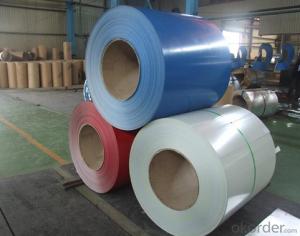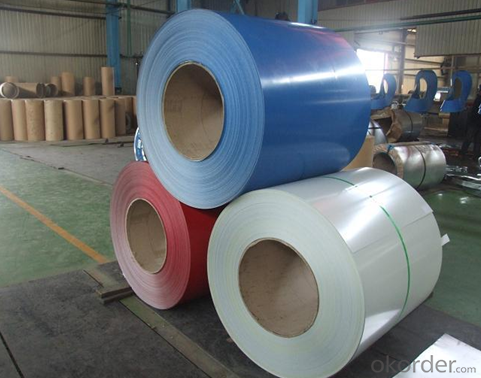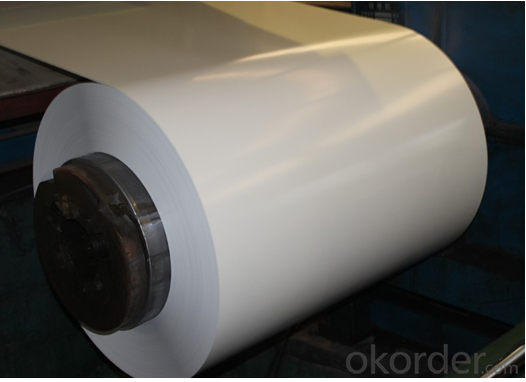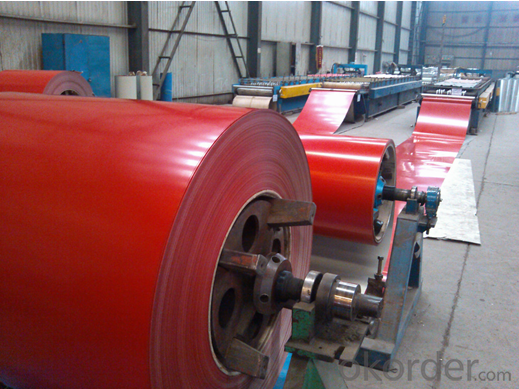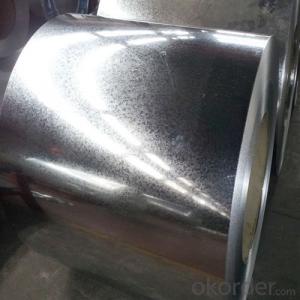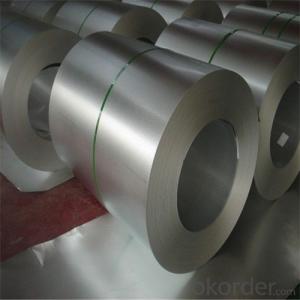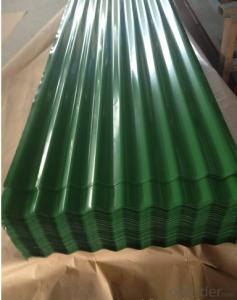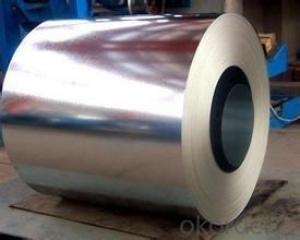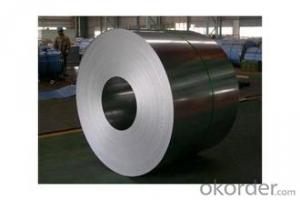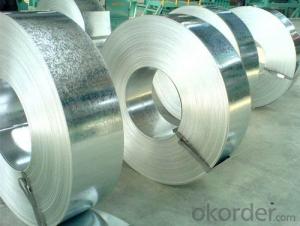Hot-Dip Galvanized/Aluzinc Steel Thickness 0.3mm-2mm Width 2000mm Max
- Loading Port:
- China main port
- Payment Terms:
- TT OR LC
- Min Order Qty:
- 100 m.t.
- Supply Capability:
- 1000000 m.t./month
OKorder Service Pledge
OKorder Financial Service
You Might Also Like
Pre-painted Galvanized Steel Coil
PPGI is made by cold rolled steel sheet and galvanized steel sheets as baseplate,
Through the surface pretreatment (degreasing, cleaning, chemical conversion
Processing), coated by the method of continuous coatings (roller coating method),
And after roasting and cooling.
SPECIFICATION
1. Standard: AISI, ASTM, BS, DIN, GB, JIS
2. Grade: DX51D+Z, DC51D, SPCC, SGCC, SGHC, CGCC,
3. Surface Treatment Coated: Galvanized, Paint sealant, Coating passivation solution
Substrate Cold rolled, Galvanized sheet
4. Color: RAL Color card
5. Coil ID: 508/610 mm
6. Coil weight: 4-10MT
7. Paint film Front side: 10~25um
Back side: 5~10um
8. Zinc layer: 40~180g per square meter
9. Thickness: 0.14~3.0mm
10. Width: 400~1500mm
11. Length: As requirement
12. Type: Steel plate, Steel Coil, Roofing metal
Advantages
1. Our company produce various specification and models and national standards of galvanized steel coil
2. Using high-quality material and advanced production technology and equipment for processing
3. Applicable to a humid climate and the harsh corrosive environment
4. Products has been all over the country more than 20 provinces, municipalities and
Autonomous regions, and have been exported to Europe, North American, the Middle East,
The South East Asia, Africa, Asia, European and other countries and regions, well received by our buyer.
commodity | Color-coated Galvanized Steel Coil (PPGI/ PPGL) |
Techinical Standard: | JIS G3302-1998, EN10142/10137, ASTM A653 |
grade | TSGCC, TDX51D / TDX52D / TS250, 280GD |
Types: | For general / drawing use |
Thickness | 0.14-2.0mm(0.16-0.8mm is the most advantage thickness)) |
Width | Width: 610/724/820/914/1000/1200/1219/1220/1250mm |
Type of coating: | PE, SMP, PVDF |
Zinc coating | Z60-150g/m2 or AZ40-100g/m2 |
Top painting: | 5 mic. Primer + 15 mc. R. M. P. |
Back painting: | 5-7 mic. EP |
Color: | According to RAL standard |
ID coil | 508mm / 610mm |
Coil weight: | 4--8MT |
Package: | Properly packed for ocean freight exportation in 20' ' containers |
Application: | Industrial panels, roofing and siding for painting / automobile |
Price terms | FOB, CFR, CIF |
Payment terms | 20%TT in advance+80% TT or irrevocable 80%L/C at sight |
delivery time |
|
Remarks | Insurance is all risks |
MTC 3.1 will be handed on with shipping documents | |
We accept SGS certificatation test |
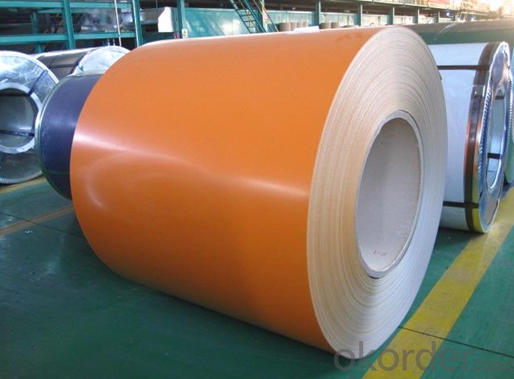
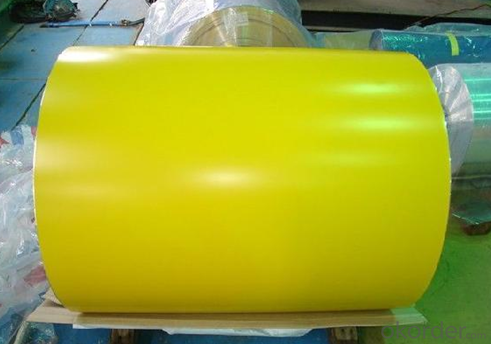
FAQ
1. Is the sample available?
Yes, samples can be sent for test if you need.
- Q: What are the different methods of cutting steel coils?
- There are several methods of cutting steel coils, including shearing, slitting, laser cutting, and plasma cutting. Shearing involves using a straight blade to cut through the coil, while slitting involves multiple circular blades that create narrower strips. Laser cutting uses a high-powered laser beam to melt and vaporize the steel, resulting in precise cuts. Plasma cutting uses a high-velocity jet of ionized gas to melt and blow away the steel, allowing for fast and accurate cuts.
- Q: Procedures for sharpening a knife with the stone and the steel?
- If you are lucky and have a whet stone block you need some patience water or light machine oil. Take your time and work in circular motion at a slight angle as to put an edge where you want it. I tend to think of it like polishing and work the length of the blade. If you work with a steel you are suppose to pull the blade across the steel at an angle. I have forgotten the angle but if you attempt this you soon find that you can associate a certain feel of the way the blade crosses the steel and know when you have it right and check the blade periodically until you have it the way you want it. There are some other sharpeners out there where you just draw the blade thru a device and they work as well. I was taught the old ways with the stone and the steel and don't know the actual prescribed angles but can tell you that you will be able to eye ball the angle and you don't have to use heavy pressure. These processes won't work on a serrated blade!
- Q: What is the weight of a steel coil?
- The weight of a steel coil can vary depending on its size and thickness. Generally, a steel coil can weigh anywhere from a few hundred kilograms to several tonnes.
- Q: How are steel coils inspected for impact resistance using impact testers?
- Steel coils are inspected for impact resistance using impact testers by subjecting them to controlled impacts of varying force and measuring the resulting deformation or damage. The testers typically consist of a pendulum or a falling weight that strikes the surface of the coil, simulating real-life impacts. The force and velocity of the impact can be adjusted as per the testing requirements. The extent of deformation or damage is then visually assessed or measured using specialized equipment, providing valuable information about the coil's ability to withstand impacts and potential performance in real-world applications.
- Q: Hello. No freakin' website has no dam info on what products have carbon steel in them. I know it's in cooking equipment and tools, but what tools?i.e It's in a wrench or strainerSo what products have carbon steel in them?
- A simplification: Carbon steel is all of the steel things that aren't either HSS (high speed steel) or Stainless Steel. It also goes under the name Mild Steel. Things like tubes used to make furniture, shelving, some tools, wire wool, older car bodies, ships, BBQs would be made from carbon steel. As well as the properties listed on the linked website it responds well to heat treatment and be hardened more than HSS but will quickly get blunt if exposed to heat. Carbon steel is often coated with zinc or is painted to stops it from rusting
- Q: What are the advantages of using steel coils over other materials?
- There are several advantages of using steel coils over other materials. Firstly, steel is highly durable and has a long lifespan, making it ideal for various applications. Secondly, steel coils have excellent strength and can withstand heavy loads and extreme weather conditions. Thirdly, steel is recyclable and environmentally friendly, ensuring sustainability. Additionally, steel coils provide superior corrosion resistance, reducing maintenance costs. Lastly, steel offers versatility in terms of customization, allowing for various shapes, sizes, and thicknesses to meet specific requirements.
- Q: I installed it, added it in F3 launcher and then after one minute of walking in wasteland I get a signal that Broken steel was added and that my level of caps was raised by 30. However after this message no quest is added. I played all 4 exp. packs and I had no problem at all, each time a new quest was added. So whats up with this Broken steel. Btw, I completed the entire game F3.
- Broken Steel doesn't begin until the main quest ends.
- Q: How do steel coil manufacturers ensure product quality?
- Steel coil manufacturers ensure product quality through several methods: 1. Quality Control: They implement rigorous quality control measures at every stage of the production process, from sourcing raw materials to final inspection. This includes regular testing, sampling, and monitoring to ensure the coils meet the required specifications and standards. 2. Advanced Technology: Manufacturers utilize cutting-edge technology and modern equipment for the production of steel coils. This helps in maintaining consistency, precision, and accuracy in the manufacturing process, leading to high-quality products. 3. Skilled Workforce: Trained and skilled professionals oversee the entire manufacturing process, ensuring that each step is executed with precision. They are responsible for monitoring, analyzing, and addressing any potential quality issues, thereby upholding the product's quality standards. 4. Compliance with Standards: Steel coil manufacturers follow industry-specific quality standards and regulations. They ensure that their manufacturing processes comply with internationally recognized standards, such as ISO 9001, to guarantee the quality and reliability of their products. 5. Regular Inspections: Manufacturers conduct regular inspections and audits to assess the quality of their steel coils. This includes both in-house inspections and third-party inspections to ensure an unbiased evaluation of the product's quality. By implementing these measures, steel coil manufacturers consistently deliver high-quality products that meet customer requirements and industry standards.
- Q: What are the common coil surface treatments available for steel coils?
- There are several common coil surface treatments available for steel coils, each serving different purposes and offering various benefits. These treatments aim to enhance the durability, corrosion resistance, and appearance of the steel coils. 1. Galvanized Coating: Galvanization is a popular treatment in which a layer of zinc is applied to the steel coil's surface. This coating provides excellent corrosion protection, preventing rust and extending the lifespan of the coil. It is commonly used in outdoor applications or environments with high humidity levels. 2. Phosphating: Phosphating is a chemical treatment that forms a thin layer of phosphate coating on the steel coil's surface. This treatment enhances the adhesion of subsequent coatings and improves the coil's paintability. It also offers some corrosion resistance and can be used as a pre-treatment before painting or powder coating. 3. Chromate Conversion Coating: Chromate conversion coating, also known as chem film or Alodine, involves applying a thin layer of chromate to the steel coil's surface. This treatment offers corrosion protection and acts as a primer for subsequent coatings, improving their adhesion. It is often used in aerospace and electrical applications. 4. Powder Coating: Powder coating is a dry finishing process in which a fine powder is applied to the steel coil's surface electrostatically and then cured under heat. This treatment provides a durable and attractive finish, offering excellent resistance to chipping, scratching, and fading. Powder coating is available in a wide range of colors and textures, making it a versatile option. 5. Organic Coatings: Organic coatings, such as acrylic, polyester, or polyurethane, are applied to the steel coil's surface as liquid paints. These coatings provide aesthetic appeal, protection against corrosion, and resistance to weathering and UV radiation. Organic coatings are often used in architectural and automotive applications. 6. Anodizing: Anodizing is a treatment primarily used for aluminum coils but can also be applied to steel coils. It involves creating an oxide layer on the surface of the coil through an electrochemical process. This treatment enhances the coil's corrosion resistance and provides an attractive finish. Anodizing is commonly used in architectural and decorative applications. It's important to note that the choice of coil surface treatment depends on the specific requirements of the application, including the desired performance, aesthetics, and environmental factors. Consulting with a professional in the steel industry can help determine the most suitable treatment for a particular project.
- Q: How are steel coils inspected for uniformity?
- To ensure uniformity, steel coils undergo a series of visual and mechanical tests. First, the coil's external appearance is carefully examined for any visible defects like dents, scratches, or rust. This is crucial to maintain the coil's integrity and prevent potential issues during further processing. Next, non-destructive testing techniques such as ultrasonic or magnetic particle inspection are used to measure the coil's thickness at various points. This helps identify any variations in thickness that could affect the overall quality and performance of the coil. Precise instruments are also employed to measure the coil's width and ensure it adheres to the required specifications. This is important for compatibility with downstream processes and applications. Furthermore, the weight of the coil is measured to verify if it falls within the specified range. Weighing scales or load cells are typically used for this purpose, ensuring consistent weight that meets the required standards. For internal inspection, steel coils may undergo eddy current testing, a non-destructive method that detects surface and near-surface defects. By utilizing electromagnetic induction, this technique can identify irregularities in the metal, such as cracks, voids, or inclusions. In summary, a comprehensive combination of visual inspections, thickness measurements, width checks, weight verification, and internal testing methods ensures thorough inspection for uniformity in steel coils. These rigorous processes guarantee the quality and reliability of the coils, enabling them to meet industry standards and customer requirements.
Send your message to us
Hot-Dip Galvanized/Aluzinc Steel Thickness 0.3mm-2mm Width 2000mm Max
- Loading Port:
- China main port
- Payment Terms:
- TT OR LC
- Min Order Qty:
- 100 m.t.
- Supply Capability:
- 1000000 m.t./month
OKorder Service Pledge
OKorder Financial Service
Similar products
Hot products
Hot Searches
Related keywords
